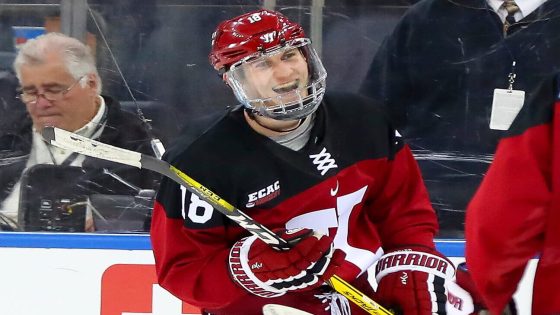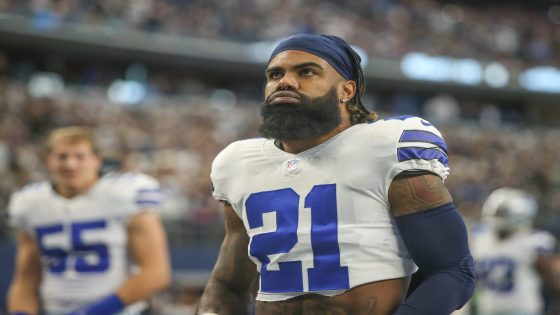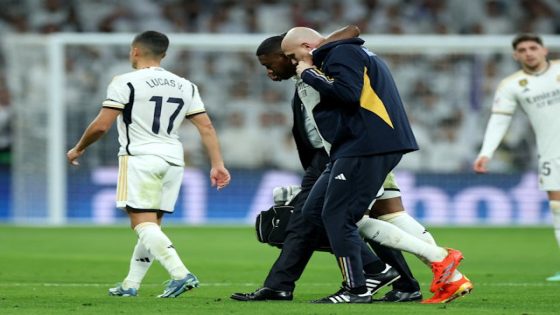Adam Fox’s gear was still damp and his spirits still high as the bus drove south past Harvard University.
In Montreal the night before, he had assisted three of Team USA’s four non-shootout goals in the 2017 World Junior Championships gold medal game, which the Americans won. Now a bus was carrying 10 players — including future NHLers Charlie McAvoy, Jordan Greenway, Jake Oettinger and Clayton Keller — back to their Boston-area college campuses. Some popped out at Boston University, others at Boston College.
Harvard was the final stop, despite being the first school the bus passed. Normally that wouldn’t have been a big deal, but the Crimson had a game against Quinnipiac that night, and puck drop was nearing.
No one could have faulted Fox for not playing. He had played two overtime games in as many nights for Team USA, and coach Ted Donato had given him permission to take Harvard’s weekend games off.
But Fox wanted in. He got to Harvard’s arena an hour before puck drop and pulled his gear out of his hockey bag and onto his body. He could feel the sweat from the night before.
“He was clearly exhausted, clearly in brutal shape,” teammate Michael Floodstrand said.
That made no difference. He had two assists in the win. He scored a goal the next night in another victory, this time against Princeton.
In four nights, he had played four games, gone 4-0, won an international gold medal and collected six points.
“I wish Fox had too many beers two nights ago so he couldn’t play,” then-Princeton coach Ron Fogarty told reporters after his team’s loss.
The decision to put himself through such a gauntlet probably wasn’t a wise one, Fox said recently. He got sick afterward, his body exhausted from ice time and travel. His willingness to suit up, though, further impressed the Harvard teammates he’d already wowed through the first half of the season and would continue to for two and a half more.
“He was the best player on the ice from day one as a true freshman,” said Alex Kerfoot, a Harvard senior captain at the time and now Coyotes forward.
Fox earned All-America honors each of his years on campus and, in his junior year, was a finalist for the Hobey Baker Award given annually to the best NCAA player. In total, he had 116 points in 97 college games and in the process led Harvard to heights it hadn’t seen in decades.
Fox left Harvard in 2019 after his junior season, signing with the Rangers after two other teams traded his rights. He continued taking classes as he emerged as an NHL star and graduated in 2021, shortly after winning the Norris Trophy as the league’s top defenseman. Now 26, Fox still loves talking about Harvard. It’s a place he made lifelong friends — ones who still love talking about him.
Fox, Colton Kerfoot and Lewis Zerter-Gossage walked into a salon near Harvard’s campus. With the 2017 NCAA playoffs on the horizon, they wanted to get frosted tips for good luck. It wasn’t Fox’s idea, but he went along for the journey. He remembered Minnesota-Duluth players dying their hair bleach blond ahead of their first NCAA championship run in 2011.
“It’s kind of like the playoff beard before you can grow a beard,” Zerter-Gossage said.
Zerter-Gossage thought more teammates would join in. Several others got mullets and outrageous haircuts. But those three, full of bravery or youthful goofiness or a combination of the two, were the only ones willing to go blond.
Unfortunately, frosted tips were too expensive. They each settled for a blond streak.
“Half of the front of our heads were covered in blond for the next four months,” Kerfoot said.
Fox went to his older brother’s college graduation with the ridiculous hairdo, but the look might’ve paid dividends: Harvard made its first Frozen Four appearance since 1994.

Fox, Colton Kerfoot and friends played a “Fire v Ice” soccer game against the women’s soccer team every year after hockey season ended. (Courtesy of Colton Kerfoot)
Fox toured Harvard and Yale and committed to the Crimson before his sophomore year of high school. When he arrived, Zerter-Gossage noticed he wasn’t the loudest voice on the team but chipped in occasional jokes and got along with everyone.
Coach Ted Donato described Fox as a strong student — he was an academic All-Ivy honoree — though the defenseman acknowledged he, like many of his classmates, benefited from grading curves in economics courses.
Fox and Colton Kerfoot, both psychology majors, started rollerblading through campus to classes together freshman year, both for fun on warm days and as a mode of transportation. Some days, if they were running late to class, they wouldn’t even take the rollerblades off when they arrived.
“Especially if it’s a lecture hall you could blend in a little more at the top,” Fox said.

Fox and Colton Kerfoot pose for a picture with friends. (Courtesy of Colton Kerfoot)
Fox lived in a couple Harvard residences, but spent much of his time in a six-person suite at Winthrop Hall, where several of his older teammates — Floodstrand, Zerter-Gossage, Jacob Olson and Michael Lackey — lived. They’d occasionally go out, but many of Floodstrand’s favorite memories were hanging out at home, spending hours playing Xbox, watching TV and bantering about anything from music to sports.
“You could’ve put us in a shack in the middle of Montana and we would’ve had a good time,” he said. “It was just guys hanging out saying some stupid s— to each other.”
They’d leave the door unlocked, and Floodstrand would sometimes come home after classes to find Fox already there. In his sophomore year, Fox would go there to binge “Game of Thrones” or play video games. “My two vices,” he said.
Nathan Krusko, who played and lived with Fox at Harvard, got more enjoyment watching his friend play Xbox than doing so himself. Fox’s desire to win extended beyond hockey. Any competition was “like life or death,” Floodstrand remembers, be it cards, golf or cornhole in the backyard.
The Winthrop suite had multiple TVs, and sometimes the hockey players would game online together from different rooms.
“We were, like, idiots,” Floodstrand said. “We would literally just sit in our rooms and get on a chat together. I’d be able to hear the guy in the other room talking but we’d all be on our own thing playing together.”
They played lots of NBA 2K, Fox said, as well as the NHL games. They took an unconventional approach to NHL, avoiding the high-flying, offensive-heavy video game style. Each of them controlled one player in the game, and they’d run set faceoff plays and dump in pucks like college teams in the Eastern College Athletic Conference.
Some of the friends, including Fox, still play online with each other.
“I use it somewhat as a time to pick his brain,” said Zerter-Gossage, who is playing professionally in Germany. “He’s got as good of a hockey brain as anyone. He really is just a junkie for the game.”
Though in real life Fox is the No. 1 defenseman on a team with Stanley Cup aspirations, Zerter-Gossage claims to be the better NHL gamer. When Fox gets frustrated and loses confidence, “I’m there trying to talk him up,” his old teammate said.
Zerter-Gossage laughs thinking about it. The exact opposite was true when they were on the ice together.

Harvard Crimson defenseman Adam Fox (18) forward Michael Floodstrand (44) celebrate after a goal during the 2018 Frozen Apple College Hockey game between the Cornell Big Red and the Harvard Crimson on November 24, 2018 at Madison Square Garden. (Photo by Rich Graessle / Icon Sportswire via AP Images)
When Fox got to Harvard, the Crimson hadn’t won the Beanpot since 1993. The annual single-elimination tournament takes place between four Boston schools: Harvard, Boston College, Boston University and Northeastern. Fox couldn’t believe it had been so long since Harvard had won.
“Two games is all it takes,” he said.
But Harvard’s program struggled through the late 1990s, then had another dip in the 2000s, failing to make an NCAA regional in eight consecutive seasons from 2007-14. Thanks in part to now-Rangers forward Jimmy Vesey, the team had started to improve heading into Fox’s freshman year. They still hadn’t gotten over the Beanpot hump, but Fox could feel it coming. He repeatedly reminded his teammates that they only had to win two games. It became a mantra among his friends.
“He obviously makes playing hockey look pretty effortless and easy, but just the way he thought about winning was kind of similar,” said Olson, who played on a pair with Fox.
Sure enough, the Crimson won two games. In the final against Oettinger, McAvoy and several BU men with whom Fox went to the world juniors, the star freshman sealed the victory. With Harvard up two in the dying minutes, Fox grabbed the puck off a defensive zone faceoff win and, while falling on a BU stick, flung it 180 feet into the empty BU net. Fox’s teammates mobbed him. Even goalie Merrick Madsen left his crease to pat him on the helmet.
“Big-time players do well in big-time games,” said Harvard teammate Ryan Donato, coach Ted Donato’s son and now a forward on Chicago.
Considering the player he is now, it’s unsurprising that Fox was dominant in college. Going into Harvard, though, he was not a particularly touted prospect. The Calgary Flames drafted him in the third round at No. 66, but he didn’t have the size and explosiveness of top picks. Evaluators, Ted Donato believed, got too hung up on what he couldn’t do and didn’t focus enough on the skills he had: elite hockey IQ and vision and an ability to remain in control at all times on the ice.
When Fox was going through the college recruitment process, his advisor and now-agent, Matt Keator, urged him to choose a program that empowered him to make plays offensively.
“You have to have a coach that allows you to be you,” he told the defenseman.
Fox found that at Harvard, where Donato quickly discovered he had a special player on his hands. The coach had to tell other Crimson defensemen not to try some of the aggressive plays Fox made on the ice. It wasn’t a slight at them; they just weren’t at the same level.
“(He would) make guys miss and make guys go different ways purely with how he handled the puck or where he gave a quick head fake,” Donato said.
Sometimes the coach held back laughter on the bench as he watched how Fox frustrated opponents, knowing his player had done the same things to teammates in practice.
In one game, Olson remembers, Fox failed to knock a cleared puck down from the air at the blue line, leading to a rush the other way. When Fox returned to the bench, an assistant told him he should have skated backward to defend rather than trying to hold the zone.
“Nine times out of 10 I’m knocking that down,” Olson remembers Fox saying back. “That’s the high probability play.”
Olson laughed knowing if he responded to a coach that way, he probably would’ve gotten an earful. That wasn’t the case with Fox, whom he thinks was probably right in that situation.
“It was fun to just get a front-row seat to watch the highlight reel that was every game,” Olson said.
In Fox’s final year, Harvard played Dartmouth in its season opener. Lackey later got to know a player from that Dartmouth team. They reflected on Fox and how Dartmouth watched video on his shot fakes pregame. Their whole Harvard scouting report was about Fox.
None of it mattered. He finished the game with five points. There was no stopping him.
The summer after his sophomore year, Fox found a way to make a little extra money. Zerter-Gossage was the chief transportation coordinator for Harvard reunions the week after final exams. He was tasked with getting rides set up to take alumni around campus, and Fox joined him as his assistant.
The alumni association gave Fox a Verizon flip phone, and he and Zerter-Gossage distributed business cards with the number to everyone coming to campus. When Fox got a call, he sent the pickup and dropoff information into a GroupMe text, and one of 25 drivers would claim the ride.

Zerter-Gossage and Fox handed out business cards to alumni with a number to call when they needed a ride anywhere on campus. (Courtesy of Lewis Zerter-Gossage)
“At some point, it was several calls a minute,” Zerter-Gossage said. “We were just absolutely hustling.”
Alumni events happened at all times, so Fox and Zerter-Gossage worked from 6 a.m. until after midnight. Usually, they were on coordinating duty and not driving, though they made exceptions.
“If we had a regular who maybe gave a nicer tip, we would (get) priority,” Fox said.
That was the last summer he needed a job for anything but hockey.
The Flames, knowing they were unlikely to sign him, traded his rights to Carolina on June 23, 2018, the summer before Fox’s junior season. The Hurricanes, though, had emerged as a playoff team with a strong group of defensemen, and Fox worried that would lead to time in the AHL or less of a leash to make mistakes in the NHL. After his junior season, his camp informed Carolina he wouldn’t sign there either. If needed, he could go back to Harvard for his senior year, then become a free agent and sign wherever he wanted. And while this is allowed by the CBA, Fox still encounters boos from fans in Calgary and Carolina. But he was in no rush to leave the school, friends and team he loved.
“I’ve always said that if you’re a player and you have any sense of ability to leverage that could put you in a better position, it’s hard not to take advantage of that,” Fox said.
There were rumblings Fox would force his way to his hometown Rangers even before his decision not to sign with Carolina. Fox dreamed of playing for New York, and he also liked that they were a rebuilding team with which he’d get an opportunity early. A month after Harvard’s season ended, Carolina traded him to the Rangers for a pair of draft picks. He signed his first professional contract two days later.
“It was a little nerve-wracking knowing you’re leaving college, you’re stepping into the real world,” Fox said.
Going into his junior year, Fox had taken an extra class to chip away at his degree. He knew he might not be back. His friends said he handled the situation professionally. They knew what he was thinking, Lackey said, though he never disclosed if he’d made up his mind on leaving or staying for his senior year.
Hockey-wise, Fox didn’t feel he dominated the college game as a freshman or sophomore. That changed as a junior when he had 48 points in 33 games and was a Hobey Baker finalist.
“He didn’t belong on the ice with us anymore,” Colton Kerfoot said.
He felt ready to make the leap and immediately slotted into the Rangers lineup in the 2019-20 season. As Alex Kerfoot said, he didn’t seem to need a transition period when going up a level, whether it’s to the college game or the NHL.
Nowadays, Fox is still in touch with plenty of his former classmates, many of whom he saw at Ryan Donato’s wedding last summer. Ted Donato remembers watching Fox mingle with his old friends that day. It brought him a sense of joy.
“It was really the ultimate proof to me that he really enjoyed everything about Harvard and not just the hockey,” the coach said.
Fox’s final college game came against Cale Makar’s UMass team in the 2019 NCAA Regionals. Harvard fell behind in the second period and never caught up, losing 4-0.
Toward the end of the game, there was a faceoff near the Harvard bench. The team was still pushing to force its way back in the game, but Krusko knew his time with Fox was likely done. He watched his teammate on the ice, breathing heavily in a crimson jersey with a large H sprawling across the front. It was clear how much he cared, how hard he was trying to will Harvard back into the fight. For Krusko, that final look up close was an out-of-body experience.
“Whoa,” he thought to himself. “It’s incredible that I’m on this person’s team.”
(Top photo of Adam Fox: Rich Graessle / Icon Sportswire via Getty Images)



